Dick Clark was one of the most recognized personalities in entertainment in America during his reign from the 1950s until his death, at age 82, on April 18, 2012. Often called “America’s oldest teenager,” he hosted two nationally syndicated radio shows: “Rock, Roll and Remember” and “The Music Survey”; live music shows; and various rock ’n’ roll video collections.
But he was, of course, best known as the longtime host of American Bandstand, beginning in 1956. Clark, born Nov. 30, 1929, was responsible, perhaps more than anyone, for bringing rock ’n’ roll into America’s living rooms at a time when many parents still weren’t sure they wanted it there. American Bandstand was, for years, the country’s highest-rated daytime show.
I talked to Clark at his office in Burbank, Calif., in 1998.
Best Classic Bands: Do you miss hosting American Bandstand?
Dick Clark: Yes, I’d be lying if I told you I didn’t, but I knew at one point I had to leave the party when I turned 60. It would be inappropriate to be still doing the show. Not that I couldn’t physically do it and pull it off, but you gotta know when to hang it up. It’s a tough decision, but I do miss it.
When did you realize how valuable your film, TV and video archives were?
I have no idea. I wasn’t bright enough to know they had historical or monetary value. But I’ve always been a collector. I never throw anything away. I started when I was a child. I saved the returned kinescopes. I begged ABC to give me the old films. We have a huge file, second or third biggest in the world. Now I realize the historical importance of all of this.
When did you know there was an afterlife with this stuff, for example clips of [’50s teen idols] Fabian and Bobby Rydell?
You mention Fabian and Bobby Rydell, but it’s Chuck Berry, Little Richard, the Crows… It’s the Jefferson Airplane, the Doors. That’s what’s so phenomenal about it. I knew it would have entertainment value. I didn’t know it would have historical value until I got older.
Related: An interview with the late Bobby Rydell
Who is the most popular requested music performer for licensing?
Buddy Holly. The irony there was that we once did a retrospective show for ABC, and I had an editor in from San Francisco who lost the Buddy Holly footage. Never found it. The only Buddy Holly footage we have is of him doing “Peggy Sue” from The Arthur Murray Dance Party. Steve Allen’s “Hound Dog” performance with Elvis [Presley] was sitting in his closet in Encino. I said, “Steve, let me make a dub of it. I’ll put it in my file and give you an extra dub.” Two, three months later, he gave me a call. “That tape I gave you, did I ever get it back?” I said, “Yes. You signed for it. Here’s the receipt.” “I can’t find it.” I struck another deal. Somebody has to be crazy enough to save stuff. I mean, the very first show of The Tonight Show is gone because NBC destroyed it. When I called for the films of ABC, they wouldn’t give them to me. Against company policy. I said, “You’re gonna scrap ’em like at ten cents a pound—let me at least buy ’em for that.” “We can’t. It’s against company policy. It’s against the rules.” Ironically, a mailroom boy called me one day and said, “I’ve got a truckload of stuff here. Cans of films and tapes that have your name on them. I’m gonna take it to the dump. Do you want it?” “DON’T MOVE THE TRUCK! I’ll be down in a minute.” We went to the truck and physically removed all those tapes that were going to be taken and burned, thrown in a pile somewhere, and saved them. So you have to cut through stupid organizational red tape. Sometimes they’re human beings and know it has value.
Related: When Public Image Ltd. wreaked havoc on Bandstand
You provided a TV platform for many seminal rock and R&B figures years before you were identified with “The Philly Sound.”
Well, one of my aggravations in life—and it really doesn’t happen much anymore—was a period of time when young music writers took a stance that American Bandstand was the home to Philadelphia recording artists: Bobby Rydell, Fabian, Frankie Avalon, Chubby Checker. These are my very dear friends. I’m not demeaning their talent, but they [the writers] never really gave any thought to the fact that the Penguins, the Crows, Little Richard, Chuck Berry, Fats Domino, Bo Diddley, all made their first appearances on Bandstand. That aggravated me, but that’s just stupid youth perpetuating an untruth. The truth has come out now and we don’t hear much about that anymore. We’ve got smarter people writing.
Watch Jerry Lee Lewis perform “Great Balls of Fire” on American Bandstand
I know Paul McCartney appeared on one American Music Awards [which Clark created]. Can we talk about the Beatles? What impressed you about them?
You asked for it (laughs). Here’s a ticket stub from November 1961 from a Beatles show, which amounts to 42 cents U.S. money. Here’s the photo of Bernie Binnick and Tony Mammarella, my former partners in Swan Records [which released the Beatles’ She Loves You”], with the Beatles when I was in the music business. After the government forced me out of the music business, they went on with it. The first record Bernie brought back was from these four kids from England with the funny haircuts. I put it (“She Loves You”) on “Rate-A-Record” (an American Bandstand segment) and the kids gave it a 73. They didn’t like it.
I thought they looked strange. I didn’t particularly care for it, because I thought it was derivative. It sounded like the Crickets and Buddy Holly, and a little Chuck Berry. Recycled old American music. I didn’t focus in on the fact that it had a different thrust. I had no idea they would go on and make their own music and change the world. The irony of the picture of Bernie and Tony with the Beatles and the record “She Loves You” was that, had Swan sold 50,000 copies of “She Loves You” that we played on “Rate-A-Record,” we would have had the rights to the Beatles ad infinitum. I said to Bernie years later, “Why didn’t you buy 50,000 copies? (laughs) This was their second release. Vee Jay Records and [owner] Ewart Abner had them first. Bernie was an alert guy. Someone called his attention and he went over to England to check the Beatles out. At the time, Capitol Records didn’t want them in the U.S.
Watch: When Dick Clark interviewed the Beatles on American Bandstand
There were racial issues that occurred when you presented and toured Black and white performers together. Can you discuss that?
“The Caravan of Stars” tours started in the late ’50s. Those were primarily Black-oriented shows with a few white performers. Pretty much stayed the same for years. We would have a couple of teen idol white types as a closer for the white audiences. We played to segregated audiences. That’s all documented. But when it came time to bring the English over, they had no feel for the racism we had in this country. I used to have long conversations and discussions with Eric Burdon of the Animals. We sat and argued about this for years (laughs). He was such a fan of Black music. I said to him, “You have no idea what this country has been through.” His first introduction was on a rock ’n’ roll tour. He found they couldn’t eat with the Black performers in public restaurants. They couldn’t stay in the same hotels. It was a revelation. We’d run into posters like, “Don’t Play Negro Music,” “Don’t Buy Negro Records.” It was a very bizarre experience. And if you are a young person, it’s gonna make an indelible impression on you.
On those package tours, did you always like the concept of presenting multiple performers on a bill: many acts, a few hits each?
I preferred multiple acts because I always had a short attention span, a plate full of a variety of things. I know that is offensive to an artist, I know there are artists that can command your attention for two hours. My personal preference is I’d rather have shorter bits and anticipate coming back for more at a later time.
What changed when American Bandstand went from being a black and white program to color?
It was the last show on ABC to go color because we were low man on the totem pole. A daytime kids’ show. What did they care? Probably one of the most colorful shows they ever had, but it didn’t make the least bit of difference to the viewers.
Watch: Believe it or not, the Doors were once on Bandstand
Bonus Videos: Watch the Ronettes on Bandstand in 1963
Here’s ABBA…
And John Travolta, on the brink of stardom…

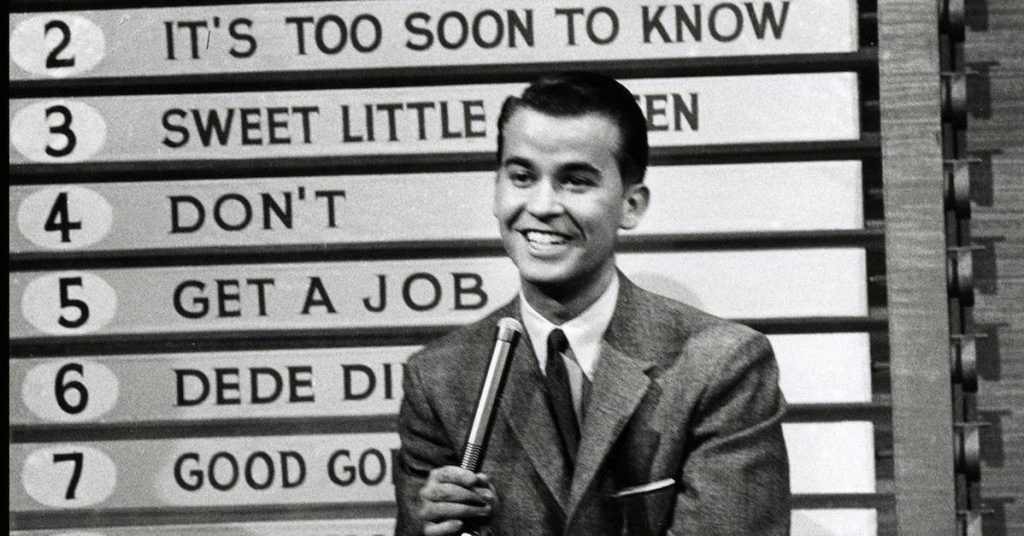
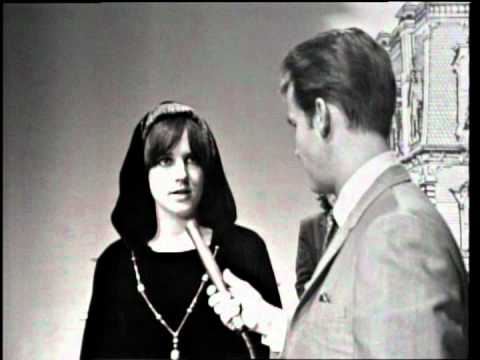
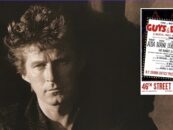
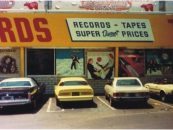
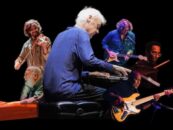
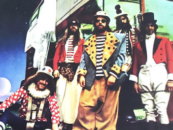

1 Comment so far
Jump into a conversationdon’t forget new years rocking eve!
also i wonder what he thought of “that thing you do” which is basically about him.